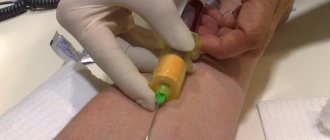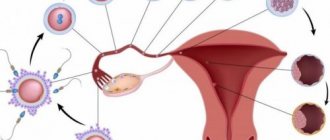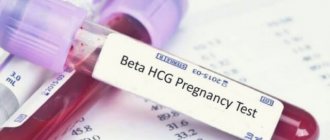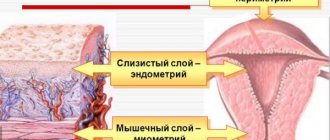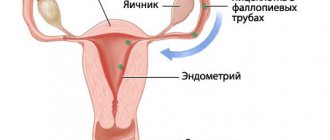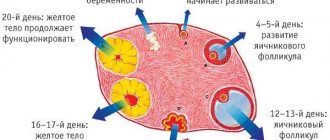How does a woman’s body behave after fertilization or conception?
First, the fertilized egg, within 5 to 10 days, travels through the fallopian tubes, towards the uterus. There it tries to strengthen itself on the wall of the mucous membrane for subsequent development. At this stage, it is extremely difficult to catch the first signs. The only obvious change before the delay is an increase in basal and body temperature.
Next, the egg enters the process of implantation - the placenta and umbilical cord are formed. This period is identified by the following symptoms:
- Painful pulling sensations in the lower abdomen. A woman may feel some fullness in the uterine area. Pain is possible in the lumbar region. These symptoms are individual for each woman and depend on the characteristics of her body.
- Swelling or swelling and tenderness of the breast. Change in color of halos in the nipple area. Breast tenderness may be accompanied by slight discharge of colostrum.
- Small beige or pink discharge at the time of egg implantation indicates its successful attachment to the uterus. The duration of discharge is no more than one day. If such a symptom lasts longer than the specified period, pain appears or the amount of discharge increases, and its color has an uncharacteristic shade, hospitalization is urgently required. This is a symptom of a threatened miscarriage.
- Increased fatigue and drowsiness, mild malaise, increased body temperature. A woman's body gets used to the new position - this becomes a test for her immune system. On what day after conception does drowsiness appear? This can start from the first week, and the adaptation period lasts about two months. Then the expectant mother’s body increases estrogen production and her health stabilizes.
- Nausea – toxicosis in early pregnancy. The female body begins to acutely sense a change in taste preferences, and an addiction or aversion to certain foods may arise. A reaction to aromas also appears - the sensitivity of the olfactory receptors is heightened; previously favorite smells can cause nausea or dizziness.
- Changes in temperature indicators. In the first days after conception, body temperature drops sharply. After implantation, the temperature increases. Therefore, at the very beginning of pregnancy, body temperature is considered normal - up to 37 degrees. And this figure lasts for the first three weeks. These temperature fluctuations are associated with an increase in estrogen in the first phase, and progesterone in the second phase.
- Emotionality and mood changes during the day. A woman's body is susceptible to mood swings - this is due to changes in hormonal levels. The psychological state of the young mother becomes vulnerable and unstable, sometimes laughter, sometimes tears.
- Insomnia is one of the signs of pregnancy. Early awakenings are also possible, which during the day require compensation for the lack of sleep.
- The occurrence of headaches , varying in intensity.
- Increased appetite. The expectant mother may feel an increased feeling of hunger. Often a woman experiences a craving for a certain product - excessive consumption of salty or sour foods.
- Frequent urge to urinate. At this moment, the woman notices that her bladder is in constant tone - there is a feeling of pressure on it.
Pregnancy rates
Did you know the difference between conception and fertilization? If not, we recommend reading this article.
It is necessary to understand that not all of the above-described signs will necessarily be noticeable in the first days after conception. Perhaps some of them will not appear at all. This depends on the individual characteristics of the pregnant woman’s body. The most reliable confirmation of the onset of pregnancy is the presence and growth dynamics of the hCG hormone in a woman’s blood.
The menstrual cycle and pregnancy: direct relationships
The menstrual cycle and pregnancy are two closely related processes. Only with a regular (normal) monthly cycle does a woman have the opportunity to become pregnant, carry and give birth to a baby. Any disorders of the monthly cycle reduce her chances of fertilization many times over, therefore, both the general well-being of a woman and her reproductive function depend on the functioning of the body, the presence of various diseases and stress. Moreover, the possibility of getting pregnant is directly related to the day of the monthly cycle.
The monthly cycle is the time period from one menstruation to the next. The normal cycle length is 21-38 days. The menstrual cycle is divided into two phases. In the 1st phase, which lasts 14 days, the body begins to prepare for a possible pregnancy. An egg grows in one of the ovaries under the influence of follicle-stimulating hormone. At the same time, a female hormone such as estrogen begins to be released into the blood. In the middle of the cycle (approximately on the 14th day) ovulation occurs. The egg leaves the ovary and travels down the fallopian tube; if she meets a sperm on her way, fertilization will occur.
The main hormone of the second phase of the cycle is progesterone. In this phase, the mucous uterine layer is prepared for implantation of a fertilized egg. If fertilization does not occur, the level of hormones in the body drops sharply, and after a few days a new monthly cycle begins. The unfertilized egg, along with blood and particles of exfoliated endometrium, is excreted from the body.
How long after fertilization and conception will obvious signs of pregnancy appear?
- Not every woman can feel the first obvious signs of pregnancy. The likelihood that an embryo can be detected at such a short time is very low. And yet, there are a number of signs that can become harbingers of pregnancy: rapid heartbeat, dizziness, nausea, sleep disturbances, frequent urination, fatigue, mood swings, decreased blood pressure, heightened sense of smell, heavy discharge, changes in taste preferences, lack of menstruation .
- Characteristic signs may appear partially and in different sequences. Each woman has her own individual story about the first days of anticipation of her new position. However, from a medical point of view, primary symptoms appear no earlier than one week after conception, later than implantation of the embryo.
A woman's feelings during pregnancy
In the early stages (before the delay of menstruation), almost all signs of pregnancy are only speculative, that is, doubtful, individually not informative. All these signs are subjective. Sometimes a woman discovers that she has any of them, even if she is not pregnant at all. This often happens if a woman is really looking forward to pregnancy and convinces herself that she feels something special.
Some women have no early signs of pregnancy at all, and they may not notice any changes in their well-being for quite a long time.
* The most well-known symptom associated with pregnancy is nausea. In some women, it appears as early as 1-2 weeks of pregnancy. However, this is rare; most often, nausea appears after the 4th week.
* Almost always during pregnancy a woman feels engorgement of the mammary glands. The breasts feel swollen and more sensitive than usual. Some women feel this already a week after conception.
* One of the first signs of pregnancy is irritability and rapid mood swings. Pregnancy affects the nervous system from the first days. However, a woman can be nervous and irritable because of the very expectation and uncertainty. In many women, this symptom is generally observed as part of premenstrual syndrome before each menstruation.
* There may be mild aching pain in the lower abdomen, in the sacrum and lower back. Usually they are somewhat different in nature from those that precede menstruation.
* A change in taste may occur (for example, the well-known craving for salty foods). It is possible that you may be intolerant to certain smells, including those you previously liked.
* A fairly common symptom of pregnancy is fatigue and drowsiness. Although, if you have often felt tired and tired before and did not get enough sleep, you may not notice it. In addition, such signs may occur due to a lack of vitamins or when the weather changes.
* Body temperature may rise slightly (up to about 37 degrees). In this case, there may be a slight malaise, like a cold.
* Presumable signs of pregnancy include a woman’s intuition. Some women claim that they feel like they are pregnant, although they do not notice any changes in how they feel.
* Most often, a woman begins to suspect pregnancy when her next menstruation is delayed. However, occasionally, menstruation may come on time even in the presence of pregnancy, although in this case the bleeding is often more scanty than usual. There may be another situation - there is no menstruation, but there is no pregnancy. Even with a regular cycle, minor glitches are sometimes possible. This can be caused by stress, weather changes, chronic lack of sleep, and a diet with significant weight loss.
Most pregnancy tests show a positive result from the first day of a missed period. However, tests have now appeared that can show the presence of pregnancy starting 4 days before the expected menstruation. However, the earlier you test, the greater the chance of false negative results.
The first hours, the first day after conception: can a woman feel something?
Despite the fact that the initial days after conception are not considered to be a full pregnancy, they lay the foundation for this process and have a great influence on the further development of the fetus.
This period is characterized by: the formation of the respiratory and digestive systems, internal organs and nervous system. The formation of a zygote gives rise to the birth of a new life. Before the embryo is implanted, a woman rarely experiences any obvious sensations.
First signs
Analysis of fetal development by day will help to understand what happens in the female body in the first days after conception:
- First day . The resulting fertilized egg strives to gain a foothold in the uterus and receive the necessary nutrition for development. The fertilized egg moves through the fallopian tube, clinging to the fleecy walls of the fallopian tubes.
Second, third, fourth day after conception: can a woman feel something?
- Second day . The movement of the egg continues. Rapid cell division occurs.
- The third day . The number of cells reaches 9 lobes.
- Fourth day . The fertilized egg, while in motion, becomes overgrown with cells; its shape resembles a blackberry. The internal organs of the fetus and important vital systems are formed. Also, in the inner part of the membrane of the embryo, blastomeres are born, which help the embryo to attach to the uterine surface.
Fifth, sixth day, week after conception: are there any symptoms of pregnancy?
- Fifth day . At this moment, the egg is firmly implanted in the mucous surface of the uterine wall. The fertilized egg merges with the blood vessels and endometrium. A woman may notice slight blood discharge and feel a tingling sensation in the lower abdomen. Also from this moment the amount of the hCG hormone in the blood increases.
- Sixth and seventh days . There is a sharp rise in basal temperature and an increase in body temperature. The embryo develops and grows, still at the expense of its own reserves.
The eighth, ninth, tenth day after conception - what a woman feels: the first signs of pregnancy
- Eighth and ninth days . The embryo develops a neural tube and placenta. Subsequently, the placenta will transform over the course of 12 weeks.
- From day 10, the baby strengthens its position in the womb and begins to receive adequate nutrition thanks to the placenta.
You can learn more about the process of conception and the initial development of the fetus here.
What is ovulation and the menstrual cycle?
The menstrual cycle is a physiological process controlled by hormones and aimed at preparing the female body for conception.
This is a period of time where the first day is the beginning of menstrual bleeding, and the last is the day before the start of the next cycle. It is repeated monthly in all women except pregnant and nursing mothers.
The duration of each woman’s cycle is individual, but on average it takes from 21 to 35 days. Moreover, depending on physiological factors (growth, hormonal changes, past illnesses), the cycle can increase or shorten.
Approximately in the middle of the menstrual cycle, ovulation occurs - essentially, this is the release of a mature egg from the ovary. The egg “lives” for about a day and its main task is to accept sperm for fertilization. If conception is successful, the fertilized egg passes through the fallopian tube into the uterus and, thus, pregnancy occurs. If conception does not occur, the egg dies and is excreted from the body along with menstrual blood.
Reference! A newborn girl has about 1.5 million eggs in utero. During puberty, their number decreases to 350-450 thousand, and decreases with each cycle.
Two weeks after conception - how a woman feels: signs of pregnancy
- The period of 2 weeks after conception is still very small for the manifestation of characteristic symptoms during pregnancy. However, some women already from this moment experience some sensations confirming their position. This may include spastic pain in the lower abdomen, as well as spotting during implantation: on days 6-12.
- Morning nausea and vomiting are possible, which disappear at the end of the second week or continue until delivery. One of the important symptoms in the second week after conception is changes in the breasts: tingling, sensitivity, swelling.
- Due to the rush of blood to the mammary glands, a venous network may appear on the chest. Itchy nipples may also occur. The feeling of fatigue increases - the young mother experiences a loss of strength.
Signs
Pregnancy test during menstruation
If you experience symptoms such as nausea, abdominal pain, or menstrual flow that is not the same as usual, take a pregnancy test. It is better to carry it out in the morning, immediately after waking up, since it is at this time that the concentration of the pregnancy hormone in the body is highest.
If the test shows pregnancy, consult a doctor immediately. After all, periods during pregnancy are not normal. Even scanty bleeding during pregnancy requires mandatory consultation with a doctor. After all, if they occur during pregnancy over four weeks, much can be done to save the unborn baby, and timely diagnosis of an ectopic pregnancy can even save a woman’s life.
Take care of your own health, undergo regular examinations with a gynecologist, and lead a healthy lifestyle.
pregnancy, menstruation
What are the first symptoms of conception and pregnancy before menstruation?
The first signs after conception often resemble premenstrual symptoms. Therefore, many women are not even aware of their new situation, mistaking their well-being for the period before menstruation.
How long after fertilization and conception will obvious signs of pregnancy appear? Before your period, there are signs that may indicate possible conception:
- Mild illness for the first few days, similar to a cold.
- Loss of strength, fatigue.
- Severe emotional mood swings: tearfulness, touchiness, irritability.
- Even if you maintain a normal sleep schedule, you will still feel sleep deprived. Long sleep does not bring a feeling of vigor.
- Tense sensation in the uterine area. There may be short-term nagging pain in the lower back and lower abdomen.
- Frequent migraines that subside in the evening.
- Discomfort in the chest area , even with a light touch.
Early signs
It is worth mentioning external changes that tell about her interesting situation:
- Swelling of the face, pallor, or vice versa – redness of the skin.
- Acne due to hormonal changes in the body.
- Hormones also cause bloating.
- The venous or vascular network becomes more noticeable.
- When does your breasts begin to hurt after conception? An increase in breast size and pain even with a light touch may appear during the first week before the delay.
How many days after conception will the test show pregnancy?
- The presence of pregnancy is indicated by the level of the hCG hormone in the urine. As a rule, its concentration appears on the 10th day after conception. The exact result will appear only after a delay.
- There are tests for hypersensitivity to the hormone that can show results after 7-8 days from the moment of fertilization. These tests may give false-positive results and require repeated testing. This is due to the fact that for the hormone to appear, the embryo must already attach to the uterus - this takes at least 7-10 days.
- If the test is done at the very beginning of the permissible period, it will first show a negative or weak result, and after 10 days it will give the long-awaited two stripes.
Various indicators
It is important to know that in case of an ectopic pregnancy the test will also be positive. To avoid danger, after testing, you should undergo a diagnosis in a medical facility to confirm the correct development of the fetus.
Can I get my period during pregnancy?
Such a phenomenon as the first menstruation during pregnancy is quite understandable. It often happens that the signal about the implantation of a fertilized egg to the body was received at the wrong time, so the hormonal levels were not completely rebuilt, and as a result, menstruation began. In this case, menstruation during pregnancy is not a deviation from the norm. As soon as the body is completely rebuilt, they will stop.
A very rare cause of menstruation during pregnancy may be the maturation of two eggs in different ovaries in one cycle. Only one of the eggs is fertilized, the other with the endometrium is exfoliated, resulting in menstruation.
It should be noted that menstruation during pregnancy can occur only in the first month. The appearance of bleeding in later stages of pregnancy should alert the woman. The reason for this phenomenon may be an imbalance of hormones in the body caused by environmental problems, inflammation, stress, medications, various diseases, so in this case it is necessary to consult a doctor and undergo a medical examination.
Bloody discharge in pregnant women can also occur due to detachment of the ovum. The reasons may be as follows:
- insufficient production of progesterone. If the function of the corpus luteum is impaired, the body of a pregnant woman produces an insufficient amount of progesterone to maintain pregnancy. To treat this disorder, the doctor prescribes drugs that are analogues of progesterone;
- the egg has attached itself to the site of the focus of endometriosis or myomatous node. In this case, the fertilized egg is poorly supplied with blood and is rejected;
- hyperandrogenism. An excess of male sex hormones (androgens) in the body can lead to rejection of the fertilized egg. This pathology is also treated with drug therapy;
- cessation of egg development as a result of defects in the formation of the genital organs and genetic abnormalities. These disorders are treated in a hospital under the direct supervision of a physician.
Bleeding can often occur during embryo rejection. If the discharge is profuse, increasing pain or fever appears, call a doctor immediately.
Some women are interested in: “Do you have periods during an ectopic pregnancy?” Medical experts say that the onset of menstruation during an ectopic pregnancy is impossible due to the action of the hormone progesterone. Often, women mistake spotting for it, which appears as a result of rejection of the fertilized egg. These discharges are usually scanty and accompanied by pain in the lower abdomen. If the pain becomes severe and acute, and heavy bleeding occurs, this indicates that the fallopian tube has ruptured, in which case urgent surgery will be required.
Changes in hCG by day from conception: description, diagram
The level of hCG in the blood depends on the stage of pregnancy and can change the indicators. There are certain coefficients that are considered to be the norm, calculated by days from the moment of conception. This table shows the norms of hCG hormone, starting from the first day of conception.
| Day after implantation | HCG indicator |
| 0 | 2 |
| 2 | 3-4 |
| 4 | 5-8 |
| 6 | 8-16 |
| 8 | 12-32 |
| 10 | 18-64 |
| 12 | 27-128 |
- It is necessary to monitor the growth of the hormone after the implantation period. You can conditionally see it by changes in basal temperature. At this moment, the hormone level is 2 mIU/ml. Then the indicators will increase up to two times, with an interval of two days.
- The data in the table gives an idea of what day the test should be done for reliable results. According to the table, high-sensitivity tests are recommended to be carried out no earlier than the eighth day, and ordinary tests - on the 12th day.
- When the day of implantation is unknown, then testing must be carried out according to calculation, where a cycle of 28 days is taken as a basis: if the approximate period of ovulation is the 14th day of the cycle, then the onset of implantation occurs on the 21st day, add 12 days to this figure and we get the day when the hormone level will reach the permissible norm for pregnancy indicator - 33 days of the cycle or 5 days of missed menstruation.
On what days can you get pregnant?
Ovulation is the day most favorable for conception. To understand how this works, you need to take a closer look at how the reproductive system functions:
- Start of the cycle. Regulae appear in the appendages, and follicle growth begins. A follicle is a kind of sac inside which new eggs mature.
- Mid-cycle: the follicle bursts, releasing a mature fertilized egg. The likelihood of conception reaches its peak. This means that with a 28-day cycle, the highest chance of getting pregnant occurs on days 14-15 (the day of ovulation) as well as the day before and after it.
Note! Spermatozoa retain their viability for 5-7 days after they enter the female body.
Days on which it is impossible to get pregnant
Some women are of the opinion that if you have sex on so-called safe days, you don’t have to use protection - pregnancy still won’t occur - this is a misconception. The fact is that there are no absolutely “safe” days - there are only periods during which the probability of conception is minimal:
- Before menstruation: the endometrium is preparing for detachment, and accordingly, the likelihood of conception is minimized. In addition, low levels of progesterone and estrogen prevent pregnancy.
- During your period: The first day of your period is also not the best time to try to conceive. Progesterone and estrogen are still at too low levels, and the egg has just begun to mature.
More on the topic
On what days of the cycle can you not get pregnant?
Probability of getting pregnant on different days of the cycle
How long does an egg live after ovulation?
When do periods begin after childbirth?
What happens during ovulation in the female body?
Note! If you constantly forget about when your period is due, start keeping a diary or download a special calendar application to track your cycle.
Can a woman feel unwell as a sign of conception?
- One of the first signs of conception is a woman's slight discomfort. These days, due to decreased immunity, some chronic diseases may worsen, and body temperature increases.
- In some cases, nasal congestion and chills are observed. However, such symptoms do not last long and the body temperature does not exceed 37 degrees.
Feeling unwell
Can cystitis begin as a sign of conception?
- Symptoms of pregnancy are in some ways similar to those that accompany cystitis: frequent urge to urinate, bloody spots in the urine, dark urine, increased body temperature.
- However, there are some differences between conception and bladder disease. Unlike cystitis, with frequent urination during conception there is no cutting pain, emptying the bladder causes relief.
- Body temperature does not exceed 37.5 degrees. It must be said that the onset of pregnancy, against the background of decreased immunity, can indeed provoke the development of cystitis in some cases. But this is not considered normal, but is the result of the development of pathogenic microorganisms in the bladder.
- If such symptoms appear, it is recommended to visit a doctor, where an examination will be prescribed in order to establish pregnancy and prescribe special treatment.
Cystitis often occurs
What risks can occur at the beginning of pregnancy?
- It is important to know that the first trimester of pregnancy is decisive. During this period, the woman’s interesting position may be threatened by the following factors: ectopic or frozen pregnancy, pathologies of fetal development, threat of miscarriage.
- These disorders can be caused by reasons such as acute respiratory viral infections, infectious diseases of the reproductive tract and sexually transmitted diseases, colds, smoking and alcohol, heavy or spotting , in combination with pain in the lower abdomen, acute pain in the lumbar region, injuries, physical activity, stress.
- To avoid disturbances in the development of the fetus, in the initial days of pregnancy, you should take precautions and lead a healthy lifestyle, beware of stressful situations, infections and overwork, spend more time outdoors, adhere to a sleep schedule and proper nutrition.
Pregnancy - sensations in the first days after conception: reviews
Reviews from women about pregnancy and feelings after conception:
- Natalya, 40 years old. Probably the issue of motherhood is one of the most popular among women. Our body is so unpredictable that it can be very difficult to independently recognize conception, without an accurate diagnosis. Every time, before menstruation, I observed in myself almost all the symptoms similar to those experienced in the first days of conception, but these were symptoms of PMS. And in the cycle, when the long-awaited pregnancy came, I did not feel a single omen before the delay. I believe that it is better to determine conception by testing for hCG.
- Polina, 25 years old. It was interesting to compare my feelings with those described in the article. A lot of things coincide. Now my position has already been determined by ultrasound - the period is 6 weeks. From the first week I already understood that a new life had arisen in me. The basal temperature chart helped me track this. 10 days after implantation I took a test and it showed two stripes.
- Anastasia, 22 years old. For me, this article is relevant now. I was just looking for information about the first signs. We, planning parents, will face all the accompanying circumstances in the near future. We would like to be prepared so as not to miss such an important period for us.

